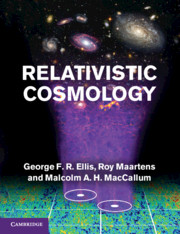Book contents
- Frontmatter
- Contents
- Preface
- Part 1 Foundations
- Part 2 Relativistic cosmological models
- Part 3 The standard model and extensions
- Part 4 Anisotropic and inhomogeneous models
- Part 5 Broader perspectives
- 20 Quantum gravity and the start of the universe
- 21 Cosmology in a larger setting
- 22 Conclusion: our picture of the universe
- Appendix: Some useful formulae
- References
- Index
20 - Quantum gravity and the start of the universe
from Part 5 - Broader perspectives
Published online by Cambridge University Press: 05 April 2012
- Frontmatter
- Contents
- Preface
- Part 1 Foundations
- Part 2 Relativistic cosmological models
- Part 3 The standard model and extensions
- Part 4 Anisotropic and inhomogeneous models
- Part 5 Broader perspectives
- 20 Quantum gravity and the start of the universe
- 21 Cosmology in a larger setting
- 22 Conclusion: our picture of the universe
- Appendix: Some useful formulae
- References
- Index
Summary
In approaching the issue of how the universe started, it is common cause that we have to face up to the unsolved problem of quantum gravity: the domain where Einstein's theory of gravity is expected to break down because quantum effects become so dominant that they affect the very nature of space and time. Comparing the gravitational constants of nature with those from quantum theory leads to the Planck length ℓP ≈ 10-33cm, which is taken to be the characteristic scale at which quantum gravity dominates. By contrast, most (but not all) variant classical gravitational theories modify GR at low energies (see Chapter 14).
Quantum gravity processes are presumed to have dominated the very earliest times, preceding inflation: the geometry and quantum state that provide the initial data for any inflationary epoch themselves are usually assumed to come from the as yet unknown quantum gravity theory. There are many theories of the quantum origin of the universe, but none has attained dominance. The problem is that we do not have a good theory of quantum gravity (Rovelli, 2004, Weltmann, Murugan and Ellis, 2010), so all these attempts are essentially different proposals for extrapolating known physics into the unknown. A key issue is whether quantum effects can remove the initial singularity and make possible universes without a beginning.
In addition, the weakness of the gravitational force implies that it will be very difficult, though perhaps not impossible, to observationally test theories of quantum gravity.
- Type
- Chapter
- Information
- Relativistic Cosmology , pp. 511 - 534Publisher: Cambridge University PressPrint publication year: 2012



